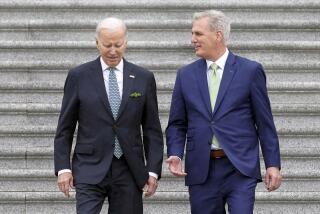NEWS ANALYSIS : Democrats Fear How Far Clinton Will Bend on GOP Budget : After a White House meeting, some party leaders worry that President’s ‘triangulation’ leaves them out of the loop.
- Share via
WASHINGTON — A recent White House gathering of Democratic lawmakers, all on the front lines of the budget battle raging in Congress, was intended as a sort of pep rally. But that did not stop New York Rep. Charles B. Rangel from asking President Clinton a tough question: “Are we all singing from the same sheet of music?”
Clinton’s equivocal response, as recalled by one of his listeners, underlined the tensions and uncertainty clouding relations between Clinton and congressional Democrats. “We should stick together as long as we can,” the President reportedly said. “But there may come a time when we disagree.”
Judging from the recent rise in his poll ratings, such swivel-hipped rhetoric has been serving the President well, helping him carry out his newly adopted strategy of “triangulation”--charting a course for his reelection by keeping his political distance from both the Republicans and the members of his own party on Capitol Hill.
But the approaching budget showdown presents that design for presidential survival with its severest test yet, a challenge in which Clinton’s chances of success may depend on the connivance of one of the most implausible allies imaginable, Republican House Speaker Newt Gingrich.
And the outcome of the clash is likely to define not only the rest of Clinton’s presidency but also the future of the Democratic Party, still struggling to find a new identity in an age of skepticism about the government activism that long has been its hallmark.
In the budget negotiations, Clinton will be under pressure to make concessions to the Republican majority on cutting federal spending and taxes--moves that presumably would bolster his appeal to middle-class voters. But for congressional Democrats, the possibility that Clinton could find common cause with Gingrich--the leader of the GOP’s conservative revolution--is especially alarming.
Such an alliance would be founded on perceived mutual interest. Although Gingrich threatened last week to prolong the budget battle for a year, some analysts believe the Speaker could well conclude that his own long-term political advantage is served by hammering out a fiscal accord that Clinton could accept without serious loss of face.
“The Republicans in Congress, at least their leaders, have every bit as much interest in having Clinton succeed as Clinton does himself,” contends Norman Ornstein, congressional affairs specialist at Washington’s American Enterprise Institute.
But if Clinton gives up too much to the GOP, he risks alienating key Democratic constituencies and the legislators who represent them.
“If he . . . goes with the Republicans and then comes to my district where I win by 75%, even if I endorse him my people might not go to him,” said Rep. Jim McDermott of Washington state, one of the 10 or so Democratic members of the House Ways and Means Committee who participated in the recent session with Clinton. “They could look at him and say, ‘Bah, we might as well have [Senate Majority Leader Bob] Dole’ ” as President.
*
Some of the Democratic lawmakers at the meeting in the White House Cabinet Room left wanting to accept Clinton’s qualified professions of support. Rangel said the session convinced him that Clinton would not leave his fellow party leaders “hung out to dry” if and when he cuts a budget deal with the GOP.
But Rep. Pete Stark (D-Hayward) said: “My sense is that we came out of there without him promising much of anything.”
Others brooded about the influence of Richard Morris, the aide credited or blamed with devising the triangulation strategy.
“I worry that this consultant has told him, ‘Cut [congressional Democrats] loose and let them sink in deep water,’ ” said McDermott. “I don’t know whether the President has really bought that as a plan or not, but all through the budget machinations there have been moments of concern.”
Still fresh and bitter for many Democrats are memories of the first demonstration of triangulation in action--Clinton’s abrupt decision in June to announce his own plan for balancing the budget, without so much of a word of warning to his party’s House and Senate leaders.
“You didn’t send any flowers, you didn’t write any letters, you didn’t even blow a kiss--you just up and left,” Rangel said as the President and his guests sipped coffee during their meeting.
Clinton’s aides claim the significance of that gambit will be overshadowed by the result of the budget debate. “I think the Democratic Party is going to be defined in terms of where the money goes and where the spending cuts are made this fall, not the fact that the President came out for a balanced budget in June,” said one senior White House official.
But that is just the point that troubled many of those Democrats in the Cabinet Room. Indeed, the forces that could shape the world’s oldest political party would likely bewilder the spirit of Thomas Jefferson, who founded it two centuries ago and whose portrait looked down on the White House parley.
The most jarring of these possibilities involves Gingrich in a scenario so infused with realpolitik, it would make Machiavelli blush. This prospect is conjured up by some analysts who believe that Gingrich would be better off with a Clinton victory in 1996, and that the Speaker is plenty smart enough to figure that out himself.
With Clinton in the White House for another term, so this reasoning goes, Gingrich not only would remain the chief agenda-maker for Republicanism in Washington, but the chance would be boosted for the GOP to expand its still modest majority in the House.
*
“Congressional Republicans know they will increase dramatically the probability they will gain seats in 1998 if Bill Clinton is reelected in 1996,” said William F. Connelly Jr., a political scientist at Washington and Lee University.
Additionally, Clinton’s reelection would free Gingrich to pursue the GOP presidential nomination in 2000 without having to worry about challenging a Republican incumbent.
The hardest part for Gingrich of closing a deal with Clinton could be avoiding a revolt from hard-core conservatives. In fact, it is these militant Republicans whom liberal House Democrats look to as unwitting allies.
“It would be in Newt’s interest to cut a deal with the President, but there are about 130 hard-line conservatives in his party who might not let him,” said one of the Democrats at the meeting.
*
An irony of which both sides are aware is that the present order of battle on Capitol Hill represents a role reversal of 1990. Then, leaders of the Democratic majority in Congress cut a deal with Republican President George Bush that included the controversial tax increase that broke Bush’s “read my lips” pledge. That accord sparked a rebellion by outraged House Republicans, led by Gingrich, a revolt that many believe not only contributed to Bush’s defeat in 1992 but also to the GOP congressional triumph of 1994.
Recalling Gingrich’s 1990 mutiny, one veteran of the Ways and Means panel said: “I don’t think people understand that we have leverage too.”
Yet it is not clear that Democrats in the House have the unity or boldness to wage such an intraparty battle.
Ideological cleavages among these House members are sharp. “There are a couple of hundred Democrats here, and we are all different,” said Rep. Sam Gibbons of Florida, the senior Democrat on the Ways and Means Committee.
Moreover, despite their uneasy relationship with Clinton, most congressional Democrats see benefits in their party retaining the White House.
“If we can’t control the Congress, we need somebody in the White House to veto stuff and work with us to get a better break with Republicans,” said McDermott. “And even if we take control again, we still need a Democratic President to get anything done.”
But what is not clear to Democrats on Capitol Hill is how much Clinton thinks he needs them.
“I really think there is some sharp division among his advisers,” Rangel said. “It’s the old question of whether he erodes his base with people who have stuck with him over the years or whether trying to walk like a Republican will pick up anything for him.”
More to Read
Sign up for Essential California
The most important California stories and recommendations in your inbox every morning.
You may occasionally receive promotional content from the Los Angeles Times.













